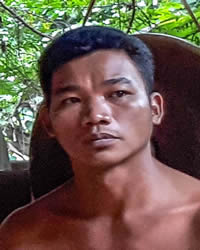Palawano, Brooke's Point in Philippines

Photo Source:
Daxster16 - Wikimedia
Creative Commons
|
Send Joshua Project a map of this people group.
|
| People Name: | Palawano, Brooke's Point |
| Country: | Philippines |
| 10/40 Window: | No |
| Population: | 14,000 |
| World Population: | 14,000 |
| Primary Language: | Palawano, Brooke's Point |
| Primary Religion: | Ethnic Religions |
| Christian Adherents: | 5.00 % |
| Evangelicals: | 1.00 % |
| Scripture: | New Testament |
| Ministry Resources: | Yes |
| Jesus Film: | No |
| Audio Recordings: | Yes |
| People Cluster: | Filipino, Tribal |
| Affinity Bloc: | Malay Peoples |
| Progress Level: |
|
Introduction / History
The Palawanun culture is like that of the Tagbanuas. Many Palawanuns live on the mainlands of the south and southwestern part of Palawan Island while others are highlanders found in the upper parts of the mountain. The highlanders retain their original culture while the lowlanders have been greatly influenced by Christian practices due to the presence of Christian missionaries, both Catholic and Protestant.
Riddles play a great part in the Palawanun courtship. This stage is called the "Pasaguli". The bride's parents usually ask the bridegroom's parents to solve riddles which if answered satisfactorily to the bride's parents, the courtship will continue to the next level until the rites of "Paabot" (Pamanhikan to Tagalogs) is reached and then the final stage which is the wedding ceremony. Weddings are celebrated by the whole village and are mostly done through servings of food, mostly cooked meat and rice wine.
The family is the basic unit of Palawanun society. Kinship is reckoned with both the paternal and maternal kin, yielding a bilateral type of social structure. But loyalty is kept to the group or area to which the family head (usually the father) belongs. The eldest man leads the family as well as the village. The village head is called "Panglima" meaning judge. In Palawanun society, deep respects the elders is the guideline for hierarchy of relationships between siblings and even group members.
Divorce occurs in the Palawanun society only for reasons of immorality, but couples need parental consent if parents are still alive. In case of inability to bear children, most couples resort to adoption of children belonging to their nearest relatives.
The Palawanuns engage in dry agriculture or "kaingin". They plant rice, root crops, bananas and vegetables. They also engage in hunting and foraging food and medicinal herbs from the forest. Those from the lowlands engage in trade with Christians and traders coming from other parts of the island. Some have put up some sari-sari stores to augment their economic needs. Some Palawanuns who have been educated through the modernization of their society are able to work in municipal offices.
The Palawanuns call their leader as "Panglima" who exercises control through traditional laws called "adaw". The folk-medicine man called "Mag-urowan" also has some influence in the village. Some lowland villages however, have been following the modern structures of government.
What Are Their Lives Like?
The Palawanuns believe in the spirits or anitos who control their lives. This is expressed in their ritual called "pagdiwata". However, contacts with Christians, both Catholics and Protestants, resulted in some conversions. Conversion to Christianity has resulted in a higher value on education for their children. At present, Islam followers are increasing due to the entrance of Islam believers who came from Mindanao.
What Are Their Beliefs?
The threat of the increase in Islamic conversion. Some Christians have not shown good testimonies to the Palawanuns. There are some land grabbing and abuses done by rich or influential outsiders which caused a lot of trouble in the Palawanun society.
Prayer Points
The highlanders and the lowlanders are quite different from each other in practices and some religious beliefs, resulting in disunity among them. Pray that they may find true unity as a homogenous minority group which will lead to strength when it comes to their need of protection and preservation.
May the changes brought by modernization truly help them improve their status locally and nationally. There is also a need for more programs in preparing the Palawanuns for the changes brought by outside influences. Education and information dissemination will help them to become more prepared for the modern changes happening in their society.